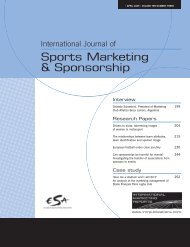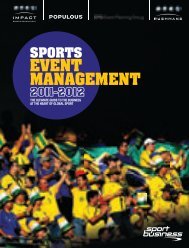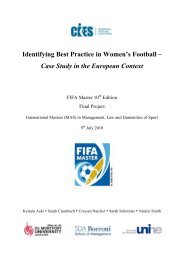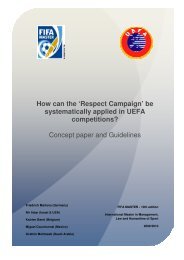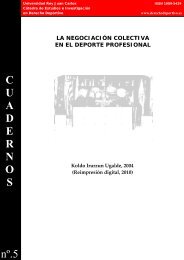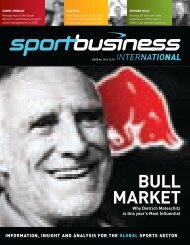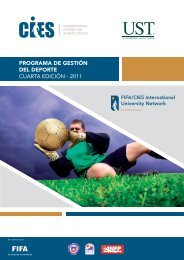Sports Marketing & Sponsorship - FIFA/CIES International University ...
Sports Marketing & Sponsorship - FIFA/CIES International University ...
Sports Marketing & Sponsorship - FIFA/CIES International University ...
- No tags were found...
Create successful ePaper yourself
Turn your PDF publications into a flip-book with our unique Google optimized e-Paper software.
Sustaining the raceFinally, while some literature suggests that motorsportis a globally significant sporting activity, given theevidence of the global environmental problems facinghumanity, there is considerable doubt as to whether itis marketed and managed in an environmentallysustainable way. The dependence of motorsport andits followers on the consumption of natural resourcesfor the manufacture and ongoing use of racingmachines, and the passenger vehicles they inspire, isan example of motorsport’s relationship withunsustainable patterns of consumption that are linkedto the major global environmental change.Furthermore, the changing environmentalcircumstances in which we find ourselves, so clearlydocumented in the GEO-4 report, appear to pose amajor challenge for the marketers of motorsport. In asituation where environmental problems are changinggovernment policy and creating new markets,marketers of motorsport are likely to need to giveserious consideration to how they might make theirevents genuinely sustainable.The literature discussed here has indicated thatsome motorsports organisations are not only aware ofglobal concerns about environmental degradation, butalso that they recognise the need for sustainablepractices. Examples cite the active role that someteams, engineers and administrators involved inmotorsport are playing in minimising their harm to theenvironment; likewise, more environmentally friendlytechnologies, fuels and practices are likely to play asignificant role in the future of motorsport.It must be said that motorsport is not alone in termsof doubts as to its sustainability. While more researchis needed to determine to what extent motorsport canbe considered environmentally sustainable, sport ingeneral is open to question because of compellingevidence that industrialised and consumption-drivensocieties around the globe are causing much of theenvironmental problems we face. Indeed, givenhuman transport needs, motorsport arguablyrepresents a sphere for automotive design andinnovation that may assist future attempts to resolveenvironmental problems.Looking ahead, the balance of evidence suggeststhat further research into the sustainability ofmotorsport is warranted because academic literaturepertaining to motorsport and sustainability is currentlyvery limited. This paper concludes that most sport,including motorsport, is likely to become greener incoming decades, and that we ought to understandmore about how and why we will approach suchadaptation.© 2009 <strong>International</strong> <strong>Marketing</strong> ReportsBiographyGreg Dingle is a lecturer in sport and recreationmanagement at the School of Sport and ExerciseScience at Victoria <strong>University</strong> (VU) in Melbourne. Heis a PhD candidate at VU and his research exploreshow and why Australian sports organisations areadapting their management practices in an era ofclimate change. Greg teaches sustainablemanagement for sport and recreation, is a member ofthe Sport Management Association of Australia andNew Zealand (SMAANZ) and has enjoyed a career inthe sports industry, including administrative positionsin water polo, a national netball league club and amanagement consultancy. He has also coachedjuniors in both cricket and Australian Rules football.ReferencesAlabama Motorsports Park (2007) Retrieved 4 November from:http://www.thehotlap.com/modules.php?name=Latest_News&op=old&min=1050Alberici, E. (2003) ‘Analyst discusses sustainable investments’ inBusiness Breakfast, Australian Broadcasting Corporation, 23June. Retrieved 1 November 2007 from: http://www.abc.net.au/businessbreakfast/content/2003/s885604.htmAmerican Plastics Council (2004) The Life Cycle of A PlasticProduct. Retrieved 26 March 2007 from:http://lifecycle.plasticsresource.com/step2.htmlRESEARCH PAPER● OCTOBER 2009 ● <strong>International</strong> Journal of <strong>Sports</strong> <strong>Marketing</strong> & <strong>Sponsorship</strong>93





